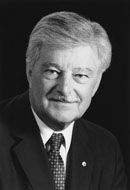Quebec wanted to assert itself as a nation and become directly involved in international affairs. During this period, people from Quebec began to refer to themselves as “Québécois” rather than “French Canadians.”
The Québécois were proud of their Francophone identity and began building relationships with other Francophone countries around the world. In 1961, the government created the Délégation générale du Québec and went to France to inaugurate the Maison du Québec in Paris. This was a unique and important moment in Quebec’s political history because Quebec Premier Jean Lesage was welcomed as a true head of state, not just a provincial leader.
Minister of Education Paul Gérin-Lajoie was interested in Quebec’s involvement abroad. In his 1965 speech, he defended the idea that Quebec should be allowed to make its own international agreements on provincial matters.

In the 1970s, Paul Gérin-Lajoie was president of the Canadian International Development Agency (CIDA). He is credited with laying the groundwork for expanding provincial jurisdiction to include international matters. Quebec maintained a certain amount of independence from Ottawa for its recognized areas of jurisdiction such as culture, education and health.